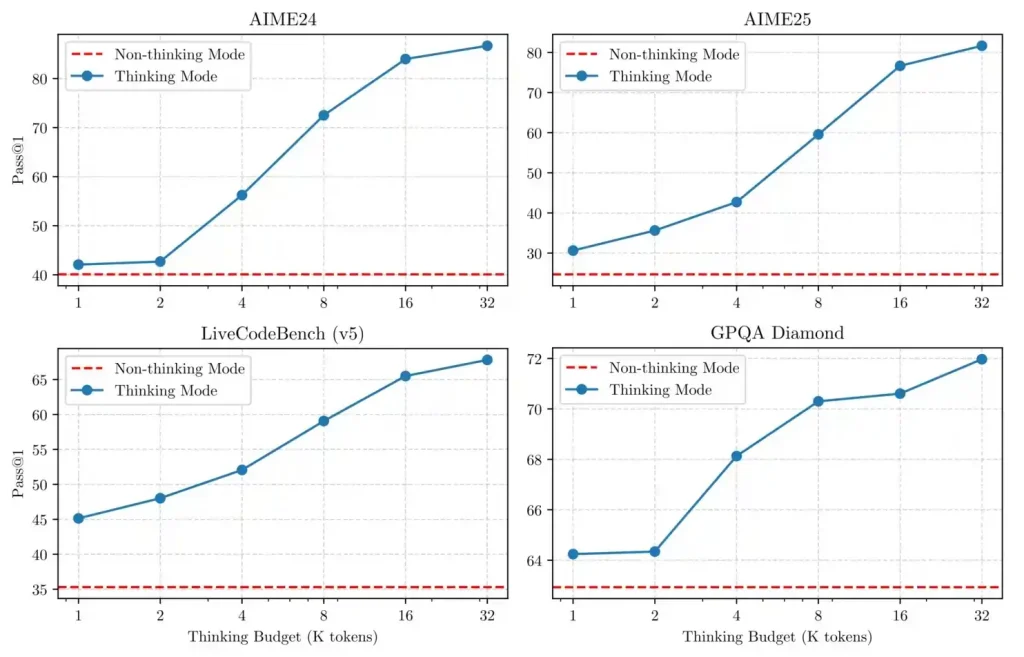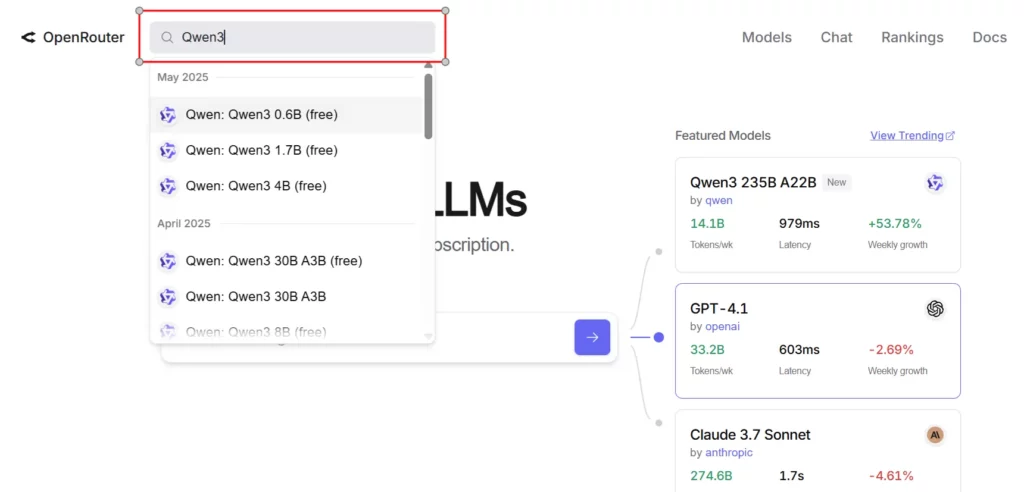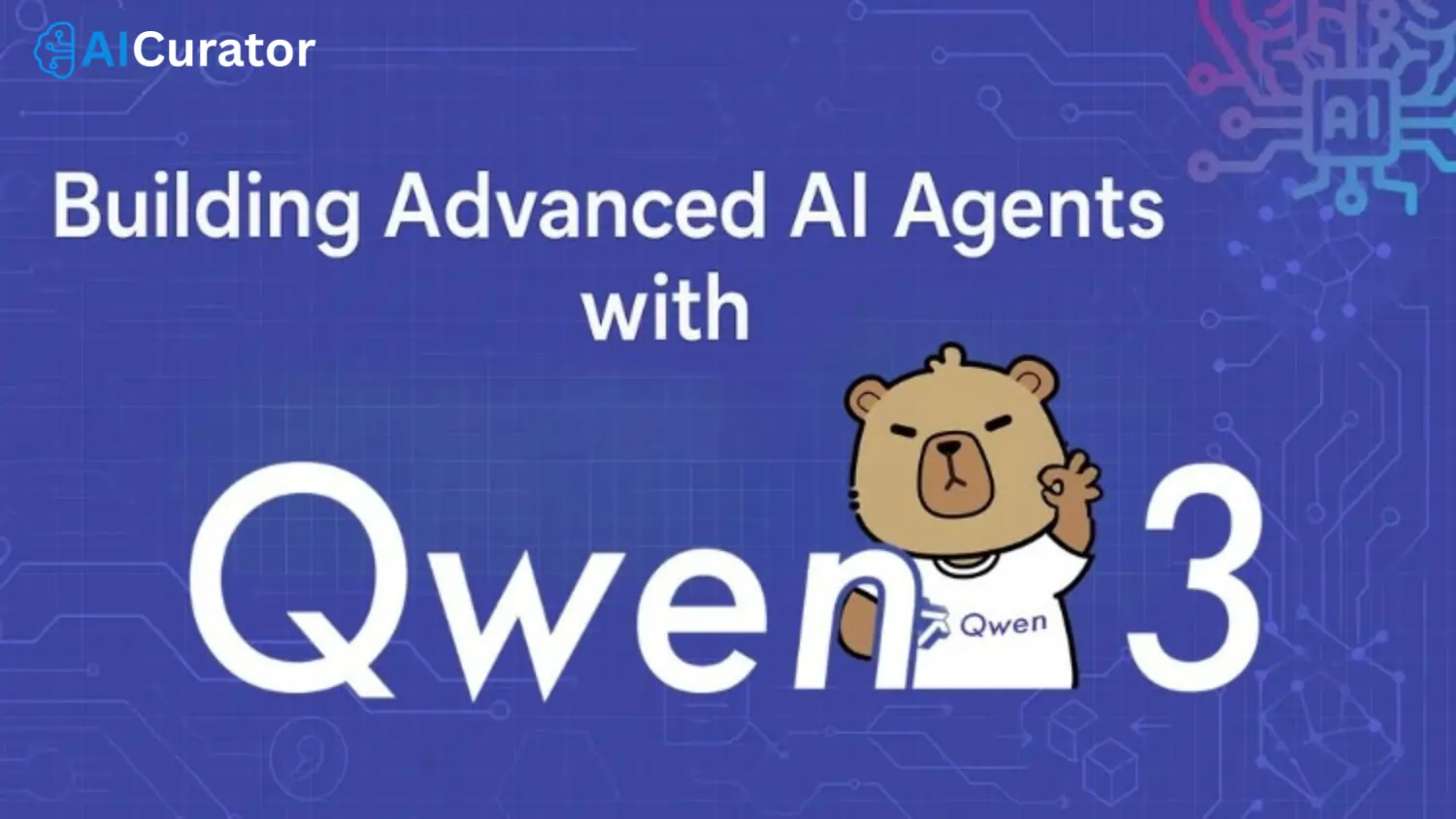Alibaba's Qwen3 has taken the AI world by storm, releasing eight powerful models that outperform many industry leaders in standard benchmarks.
The flagship Qwen3-235B-A22B model has surpassed competitors like DeepSeek-R1, OpenAI's o1, and even Gemini 2.5-Pro, while the compact Qwen3-30B-A3B achieves remarkable efficiency with just 3B active parameters.
This technical guide will show you exactly how to harness these powerful models to build sophisticated AI agents and RAG systems that deliver exceptional performance.
Understanding Qwen3's Architecture and Capabilities
Qwen3 introduces several architectural innovations that make it particularly well-suited for agent-based applications:
Model Architecture Breakdown:
| Model | Total Parameters | Active Parameters | Architecture | Context Length |
|---|---|---|---|---|
| Qwen3-235B-A22B | 235 Billion | 22 Billion | MoE (94 layers) | 128K tokens |
| Qwen3-30B-A3B | 30 Billion | 3 Billion | MoE (48 layers) | 128K tokens |
| Qwen3-32B | 32 Billion | 32 Billion | Dense (64 layers) | 128K tokens |
| Qwen3-14B | 14 Billion | 14 Billion | Dense (40 layers) | 128K tokens |
| Qwen3-8B | 8 Billion | 8 Billion | Dense (36 layers) | 128K tokens |
| Qwen3-4B | 4 Billion | 4 Billion | Dense (36 layers) | 32K tokens |
| Qwen3-1.7B | 1.7 Billion | 1.7 Billion | Dense (28 layers) | 32K tokens |
| Qwen3-0.6B | 0.6 Billion | 0.6 Billion | Dense (28 layers) | 32K tokens |
What makes Qwen3 particularly powerful for agent development is its hybrid thinking approach. The model can dynamically switch between:

This dual-mode capability allows Qwen3 to excel at agent tasks requiring both quick responses and deep reasoning. The models also feature enhanced MCP (Model Context Protocol) implementation, making tool use and function calling significantly more reliable than previous generations.
Setting Up Your Development Environment
Before building our agents, let's establish the proper environment:
python
# Install necessary packages
!pip install langchain langchain-community openai duckduckgo-search chromadb sentence-transformers
# Import key components
from langchain.chat_models import ChatOpenAI
from langchain.agents import Tool, initialize_agent
from langchain.tools import DuckDuckGoSearchRun
from langchain_community.document_loaders import TextLoader
from langchain.text_splitter import CharacterTextSplitter
from langchain_community.vectorstores import Chroma
from langchain.embeddings import HuggingFaceEmbeddings
from langchain.chains import RetrievalQAFor this tutorial, we'll be accessing Qwen3 through the OpenRouter API, which provides convenient access to these models:

python
# Initialize Qwen3 LLM
llm = ChatOpenAI(
base_url="https://openrouter.ai/api/v1",
api_key="YOUR_API_KEY", # Replace with your actual API key
model="qwen/qwen3-235b-a22b:free" # You can also use other Qwen3 variants
)Building an Advanced Travel Agent with Qwen3
Let's create a sophisticated travel planning agent that combines multiple tools and leverages Qwen3's reasoning capabilities:
1. Define Specialized Tools
First, we'll create several tools our agent can use:
python
# Web search tool for updated information
search = DuckDuckGoSearchRun()
# Destination recommendation tool
def get_destinations(destination):
return search.run(f"Top tourist attractions in {destination} with visiting hours and entrance fees")
destination_tool = Tool(
name="Destination_Recommender",
func=get_destinations,
description="Finds detailed information about top places to visit in a specific city or location"
)
# Currency conversion tool
def convert_currency(query):
try:
# Parse the query to extract amount, source and target currency
parts = query.split()
amount = float([s for s in parts if s.replace('.', '', 1).isdigit()][0])
source_currency = None
target_currency = None
for i, part in enumerate(parts):
if part.upper() in ["USD", "EUR", "GBP", "INR", "JPY", "CAD", "AUD"]:
if source_currency is None:
source_currency = part.upper()
else:
target_currency = part.upper()
# Simplified static conversion rates (in real app, use an API)
rates = {
"USD": {"EUR": 0.92, "GBP": 0.78, "INR": 83.2, "JPY": 154.5, "CAD": 1.36, "AUD": 1.51},
"EUR": {"USD": 1.09, "GBP": 0.85, "INR": 90.4, "JPY": 167.9, "CAD": 1.48, "AUD": 1.64},
# Add other currency pairs as needed
}
if source_currency and target_currency and source_currency in rates and target_currency in rates[source_currency]:
converted = amount * rates[source_currency][target_currency]
return f"{amount} {source_currency} = {converted:.2f} {target_currency}"
else:
return "Conversion not available. Please specify currencies like 'USD to EUR' or 'INR to JPY'."
except:
return "Couldn't parse the conversion request. Format: 'convert 100 USD to EUR'"
currency_tool = Tool(
name="Currency_Converter",
func=convert_currency,
description="Converts between different currencies using current exchange rates"
)
# Weather information tool
def get_weather(location):
return search.run(f"Current weather and 3-day forecast for {location}")
weather_tool = Tool(
name="Weather_Forecaster",
func=get_weather,
description="Provides current weather and forecast for a location"
)2. Initialize the Advanced Agent
Now we'll create our agent with these tools:
python
# Combine all tools
tools = [destination_tool, currency_tool, weather_tool]
# Initialize the agent with Qwen3
travel_agent = initialize_agent(
tools=tools,
llm=llm,
agent_type="zero-shot-react-description",
verbose=True,
handle_parsing_errors=True,
max_iterations=6
)3. Implement a Comprehensive Travel Planner
Let's create a more robust travel planning function:
python
def comprehensive_trip_planner(city, duration_days, budget, currency="USD", interests=None):
"""
Creates a comprehensive travel plan
Args:
city: Destination city
duration_days: Number of days for the trip
budget: Budget amount
currency: Currency of the budget (default USD)
interests: Specific interests (e.g., "museums, hiking, food")
"""
# Craft a detailed query for the agent
interests_str = f" with focus on {interests}" if interests else ""
query = (
f"Create a detailed {duration_days}-day itinerary for {city}{interests_str}. "
f"The total budget is {budget} {currency}. Include: "
f"1. Top attractions with estimated time needed and entrance fees "
f"2. Weather forecast to help with planning "
f"3. Currency conversion of the budget to local currency "
f"4. Recommended local food and transportation options "
f"5. Estimated daily expenses breakdown"
)
# Run the agent
response = travel_agent.run(query)
return response4. Test the Agent's Performance
python
# Example usage
itinerary = comprehensive_trip_planner(
city="Kyoto",
duration_days=3,
budget=1500,
currency="USD",
interests="traditional culture, temples, and local cuisine"
)
print(itinerary)Building a High-Performance RAG System with Qwen3
Qwen3's hybrid reasoning capabilities make it ideal for sophisticated RAG systems. Here's how to build an advanced implementation:
1. Document Processing and Embedding
python
# Load and process documents
loader = TextLoader("path_to_your_knowledge_base.txt")
documents = loader.load()
# Create semantically meaningful chunks
text_splitter = CharacterTextSplitter(
separator="\n\n",
chunk_size=500,
chunk_overlap=100,
length_function=len
)
document_chunks = text_splitter.split_documents(documents)
# Use high-quality embeddings
embeddings = HuggingFaceEmbeddings(model_name="sentence-transformers/all-mpnet-base-v2")
# Create vector store with metadata filtering capability
vectorstore = Chroma.from_documents(
documents=document_chunks,
embedding=embeddings,
collection_name="qwen3_kb",
persist_directory="./chroma_db"
)2. Building an Advanced RAG Chain
python
# Configure an optimized retriever
retriever = vectorstore.as_retriever(
search_type="mmr", # Maximum Marginal Relevance for diversity
search_kwargs={
"k": 5, # Retrieve more documents for better context
"fetch_k": 20, # Consider more documents before filtering
"lambda_mult": 0.7 # Balance between relevance and diversity
}
)
# Create a more sophisticated RAG chain with Qwen3
from langchain.prompts import PromptTemplate
# Custom RAG prompt template
rag_prompt_template = """You are an expert AI assistant powered by Qwen3. Use ONLY the following context to answer the question. If you don't know the answer based on the context, say you don't know rather than making up information.
Context information:
{context}
Question: {question}
Think through this step-by-step, considering all relevant information in the context, and provide a detailed, accurate answer:"""
PROMPT = PromptTemplate(
template=rag_prompt_template,
input_variables=["context", "question"]
)
# Create the RAG chain with the customized prompt
from langchain.chains import RetrievalQA
rag_chain = RetrievalQA.from_chain_type(
llm=llm,
chain_type="stuff",
retriever=retriever,
return_source_documents=True,
chain_type_kwargs={"prompt": PROMPT}
)3. Implementing Advanced RAG Query Processing
To make our RAG system even more powerful, let's add query transformation:
python
def enhanced_rag_query(user_query):
"""Process a user query with advanced RAG techniques"""
# Step 1: Query improvement with Qwen3
query_improvement_prompt = f"Transform the following user question into a more detailed search query that will help retrieve relevant information from a knowledge base. Original question: '{user_query}'"
improved_query = llm.predict(query_improvement_prompt)
# Step 2: Retrieve information with the improved query
raw_result = rag_chain({"query": improved_query})
# Step 3: Generate the final response
answer = raw_result["result"]
sources = [doc.page_content for doc in raw_result["source_documents"]]
return {
"original_query": user_query,
"improved_query": improved_query,
"answer": answer,
"sources": sources
}Activating Qwen3's Thinking Mode for Complex Reasoning
Qwen3's unique thinking mode can be activated for complex queries, significantly improving reasoning quality:
python
# Enabling thinking mode with the OpenRouter API
llm_with_thinking = ChatOpenAI(
base_url="https://openrouter.ai/api/v1",
api_key="YOUR_API_KEY",
model="qwen/qwen3-235b-a22b:free",
model_kwargs={
"enable_thinking": True, # Activate thinking mode
"thinking_budget": 0.7 # Control thinking depth (0-1)
}
)
# Using thinking mode for complex analysis
def analyze_with_thinking(complex_query):
"""Uses Qwen3's thinking mode for in-depth analysis"""
result = llm_with_thinking.predict(
f"Analyze this thoroughly: {complex_query}"
)
return resultBuilding Agentic RAG with Tool Usage
Combining RAG with tool-using capabilities creates a more powerful system:
python
from langchain.agents import Tool, AgentExecutor, LLMSingleActionAgent
from langchain.prompts import StringPromptTemplate
from langchain.chains import LLMChain
from langchain.agents import ZeroShotAgent, AgentExecutor
from typing import List, Union, Dict
# Define a RAG tool
rag_tool = Tool(
name="KnowledgeBase",
func=lambda q: rag_chain({"query": q})["result"],
description="Useful for finding information about specific topics in the knowledge base"
)
# Create combined tools list
agentic_tools = [rag_tool, weather_tool, search]
# Define the agent
agent_prompt = ZeroShotAgent.create_prompt(
agentic_tools,
prefix="You are a helpful AI assistant with access to various tools.",
suffix="Answer the user's question to the best of your ability using the tools provided.",
input_variables=["input", "agent_scratchpad"]
)
llm_chain = LLMChain(llm=llm, prompt=agent_prompt)
agent = ZeroShotAgent(llm_chain=llm_chain, tools=agentic_tools, verbose=True)
agentic_rag = AgentExecutor.from_agent_and_tools(
agent=agent,
tools=agentic_tools,
verbose=True,
max_iterations=5
)Performance Optimization and Best Practices
To get the most out of Qwen3 for your AI agents and RAG systems:
Conclusion: Qwen3- The Multilingual Powerhouse for AI Development
Forget struggling with clunky, one-dimensional language models. Qwen3 has changed the game with its hybrid thinking system that switches between deep reasoning and quick responses on demand. While other models fumble with complex tasks, Qwen3 handles everything from multi-step travel planning to sophisticated RAG systems with remarkable precision.
The 119-language support isn't just a bullet point-it's a global development opportunity. Whether you're building specialized agents, knowledge retrieval systems, or tool-using assistants, Qwen3's architecture delivers enterprise-grade results without enterprise-level resources.
The future of AI development isn't just about more parameters-it's about smarter architecture. And Qwen3 is leading that revolution.
















